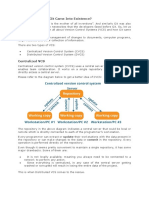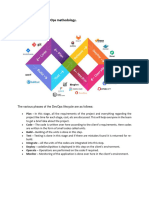0% found this document useful (0 votes)
3 views6 pagesUnit 3.1 - Git Notes
Version Control Systems (VCS) are tools that help manage and track changes to files and projects over time, with key features including change tracking, collaboration, and backup. There are three types of VCS: Local, Centralized, and Distributed, each with its advantages and limitations. Git is a popular distributed VCS that allows for efficient collaboration and version control, while GitHub is a cloud-based platform that enhances Git's functionality with additional collaboration and project management features.
Uploaded by
Byroju ThrayakshaCopyright
© © All Rights Reserved
We take content rights seriously. If you suspect this is your content, claim it here.
Available Formats
Download as PDF, TXT or read online on Scribd
0% found this document useful (0 votes)
3 views6 pagesUnit 3.1 - Git Notes
Version Control Systems (VCS) are tools that help manage and track changes to files and projects over time, with key features including change tracking, collaboration, and backup. There are three types of VCS: Local, Centralized, and Distributed, each with its advantages and limitations. Git is a popular distributed VCS that allows for efficient collaboration and version control, while GitHub is a cloud-based platform that enhances Git's functionality with additional collaboration and project management features.
Uploaded by
Byroju ThrayakshaCopyright
© © All Rights Reserved
We take content rights seriously. If you suspect this is your content, claim it here.
Available Formats
Download as PDF, TXT or read online on Scribd
/ 6































































































